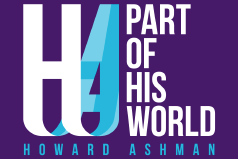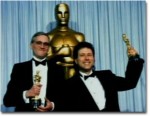Interview with Alan Menken, part one
I don’t remember the first time I met Alan Menken. No doubt it was at a rehearsal or early performance of God Bless You, Mr. Rosewater, but I’m sure I was much more excited about the possibility of being in the same room as Kurt Vonnegut than about meeting some new composer. That was 34 years ago. We’ve had a chance to get to know each other since then.
I hated to ask Alan to answer some questions for this blog. He’s been kind of busy these last few years and he gets requests from all sorts of people all the time. But around Christmas I sent an email (“I know you’re busy...do you think at some point you’d be able to…don’t worry if you can’t.” That sort of thing). Alan got back to me immediately with, “sure, shoot the questions over.”
In fact, in the years since Howard died, Alan has never been too busy for me. He’s treated Bill and me like partners in the business of keeping Howard’s work alive – which we are – all three of us.
So here we go. I tried to ask questions that aren’t always asked. More next week…
What was your first thought on meeting Howard?
I first met Howard when he came to my apartment to meet about collaborating on ROSEWATER. My first impression was that he seemed edgy and guarded. He wore torn jeans and a bomber jacket. He talked with a tight, intense energy, chain-smoking the entire time. And he was clearly very smart.
How about upon seeing the WPA theater for the first time?
I fell in love with the WPA Theater from the first moment I arrived there. It was a no-frills, creative playground. Kyle [Renick, co-founder of the WPA] and Howard clearly had a very authentic history together. And I felt, for the very first time, a sense of ownership of my own process.
Howard was a bit of a perfectionist, I know, and demanding of himself and others when working. Was there ever a time you wanted to slam down the keyboard cover and say, “Enough, already”? It’s okay to answer this, we’ll like you anyway.
Of course!
I wanted to throttle him on a regular basis. When we were working he could be controlling, impatient, demanding, cutting, arrogant and condescending. And yet, he was actually the most considerate, thoughtful, smart, compassionate wise, generous and supportive friend I’ve ever had.
Is there a particular moment in your partnership with Howard that you think personifies the way you worked together?
The moment I will never get over is when we were working on Something There for BEAUTY AND THE BEAST. We had been told that Human Again would not work for the movie; at least not in the form that we’d written it in. We were going back to the drawing board to write something more contained and simple. Howard wanted to tape the music that I’d written at his piano. He had a Walkman Pro with a little mic attached that wasn’t working right. Seemingly out of nowhere, he took this VERY expensive portable tape recorded/player and hurled it across the room. It smashed against the wall. When I got over my shock, I went to pick it up. Howard shouted “Don’t touch it!!”
With the burden of dealing with losing control of his body AIDS, not to be able to control his creative process as well was too much.
When Howard worked it was a total commitment. And every fiber in his being was brought to bear.
How did you complement each other, how and when did you butt heads?
We both loved all kinds of styles of music and what can be expressed through them. We were both all about results. It didn’t matter if the process was agonizing.
We butted heads constantly. But that was a deliberate part of our “marriage”.
Could you talk a bit about how you dealt with Howard’s illness. Being in this business, I know you lost other friends and colleagues, can you talk about that period during the AIDS crisis?
The period, from 1981 thru 1995 was like living through a war, with unthinkable casualties and no end in sight. My first experience with AIDS was late in ’81, with a workshop of a rock musical I’d written titled ATINA: EVIL QUEEN OF THE GALAXY. Our stage manager came down with this intestinal bug that seemed to be cropping up elsewhere in the world. He was losing weight and strength. And, shortly after that workshop he died. Something was wrong in the universe. I felt it strongly in my gut. It cropped up in dreams, before I knew what was to come.
And then the avalanche hit. Directors, writers, producers, designers, choreographers, musicians etc etc etc… And those of us who knew and loved Howard said to ourselves “But, please, not Howard…” And he would reassure us all that he was fine. His weight loss was due to colitis or a hernia. And we all happily believed him.
Then, at the height of our success, with THE LITTLE MERMAID, it was becoming impossible for the secret to be kept any longer. At the Governors Ball, following the Oscars in 1990, Howard sat with me and said “When we get back to New York we have to talk. Not tonight.” And two days later he told me about being sick – HIV Positive; a death sentence.
Ironically, the emotional explosions at our work sessions stopped. We now shared this reality and I think it made things a little easier for him.
For me, it was a hellish period. My wife Janis knew, but I couldn’t tell anyone else. All I can say is that the emotions that were bottled up and dealt with on a personal level by Howard and me and probably most everyone else working with us is reflected in our score to BEAUTY AND THE BEAST.
Next week: Working together and what might have been.


